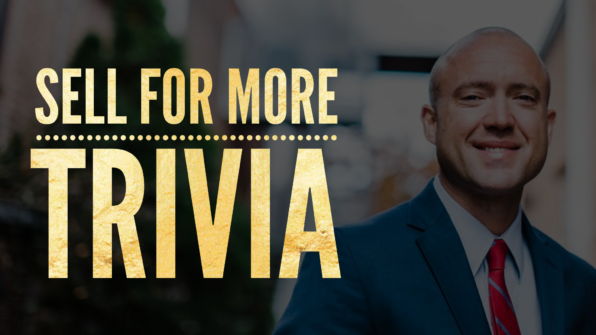Sell for More Trivia is a weekly blog series that playfully presents a trivia question about commercial real estate.
A seller of a commercial property can potentially owe up to 4 different taxes:
- Recaptured deprecation (25%)
- Federal capital gains (15% – 20% depending on taxable income)
- 3.8% net investment income tax (when applicable)
- State tax (depends on your state)
A 1031 tax-deferred exchange provides the investor with a way to delay paying these taxes by exchanging an investment property for another. The 1031 Exchange is quite common…however, there are a few often forgotten rules:
The most common is that you are required to identify the potential replacement properties within the first 45 days.
Other forgotten rules include:
The timeline starts when you close on the relinquished property (the property you are selling).
You will have 180 days to complete the exchange after you close escrow on the relinquished property.
The sales contract will need to include specific language whether buying or selling a property. One provision is that the sales contract can be assigned to the exchange accommodator.
You should hold an investment property for one year. As part of an exchange, a property needs to be held as “an investment” to qualify for an exchange. The IRS makes no indication how long a safe holding period may be to qualify automatically, but in asking a tax advisor many say at least one year.
Selling a rental house and buying an office building qualifies. The IRS requires you to exchange “like-kind” property. What this means is exchanging a property held for investment for another property held for investment. If you own four single-family rental houses… you could exchange these into one commercial office building.
You may purchasing your replacement property first. The transaction is more complex and does cost more in fees, but you could buy the replacement property before you sell your relinquished property. This is called a reverse exchange and has its own set of rules that must be strictly followed.
You do not need to use all of your equity in acquiring the replacement property, but any amount that is not reinvested in a replacement property of equal or greater value will be taxed as “boot.” Keep in mind that if you have a loan on the relinquished property your replacement property must have a loan as well of equal or greater value or you could also be taxed on the difference.
You exchange into a rental house and later decide to move into it as your principal residence. The IRS will look at your original intent and how long you held as an investment property. However, it possibly could be done.
(FREE PROMOTION) Find out how much your property is worth, for free, before you list it for sale. Get the blueprint to sell your property for the highest price the market will pay (click here)
How to get an unfair advantage. Click here to join Sell for More Club today.
Own a business? 90% of business owners don’t know the market value of their business. If you’re considering selling a business, click here for a free business valuation.
About Beau Beach, MBA CCIM
Beau is a tenacious Commercial Real Estate Broker, author and adoring father of four. His clients appreciate his no-nonsense demeanor and his legendary work ethic.
Beau leads Beachwood which is a commercial real estate broker for sellers in the Nashville, Milwaukee and South Florida markets.
He’s the author of the books The 3 Reasons: Why Most Commercial Properties Don’t Sell and True Wealth: What Every Seller Should Know About 1031 Exchanges.
Beau can be reached at 800-721-3287, click to schedule a call or Beau@soldbybeachwood.com
